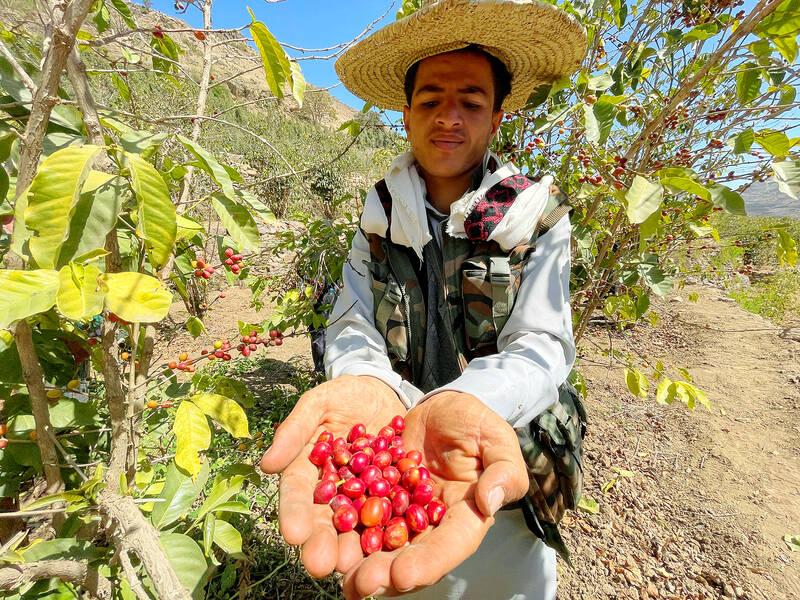Having high levels of caffeine in your blood may lower the amount of body fat you carry and reduce the risk of type 2 diabetes, research suggests.
The findings could lead to calorie-free caffeinated drinks being used to reduce obesity and type 2 diabetes, though further research is required, the researchers wrote in the BMJ Medicine journal.
Katarina Kos, a senior lecturer in diabetes and obesity at the University of Exeter, said the research showed potential health benefits for people with high levels of caffeine their blood, but added: “It does not study or recommend drinking more coffee, which was not the purpose of this research.”

Photo: AP
She said any caffeinated drinks containing sugar and fat would offset the positive effects.
The researchers said their work built on previously published research, which suggested that drinking three to five daily cups of coffee, containing an average 70-150mg of caffeine, was associated with a lower risk of type 2 diabetes and cardiovascular disease.
As those were observational studies, they made it difficult to pinpoint whether the effects were because of caffeine or other compounds, the researchers said.

Photo: Reuters
This latest study used a technique known as Mendelian randomization, which establishes cause and effect through genetic evidence. The team found two common gene variants associated with the speed of caffeine metabolism, and used these to work out genetically predicted blood caffeine levels and whether this was associated with lower BMI and body fat.
People who carry genetic variants associated with slower caffeine metabolism drink less coffee on average, yet have higher levels of caffeine in their blood than people who metabolize it quickly.
The researchers found that nearly half of the reduction in type 2 diabetes risk was driven by weight loss. Caffeine is known to boost metabolism, increase fat burning and reduce appetite, with a daily intake of 100mg estimated to increase energy expenditure by about 100 calories a day.
There are limitations to the findings, including that the research was based on nearly 10,000 people of predominantly European ancestry, who were taking part in six long-term studies.
Stephen Lawrence, an associate clinical professor at the University of Warwick’s medical school, said the study was “interesting” and used “good science,” but noted that the Mendelian assessment was a “relatively new technique” and, although useful, was “vulnerable to bias.”
He said it could lead to future studies that could eventually develop promising treatments.
“This represents good hypothesis-forming or idea-forming science. It does not, however, prove cause and effect. We therefore need to be cautious not to rush to over-interpret it.”
The authors made a “big leap of faith” in assuming that the weight loss brought about by increased caffeine consumption would reduce the risk of developing type 2 diabetes, Lawrence said, adding that it was not more effective than reducing calorie intake and increasing physical activity.
Additionally, caffeine consumption gave some people palpitations and abnormal heart rhythms, so it was not suitable for everyone.
“Should people drink more coffee to reduce fat or diabetes risk? The science suggests relatively good evidence that consuming caffeine increases fat burning, even at rest,” he said. “However, it does not constitute a treatment for obesity and, used wrongly, may result in weight gain or even harm.”

William Liu (劉家君) moved to Kaohsiung from Nantou to live with his boyfriend Reg Hong (洪嘉佑). “In Nantou, people do not support gay rights at all and never even talk about it. Living here made me optimistic and made me realize how much I can express myself,” Liu tells the Taipei Times. Hong and his friend Cony Hsieh (謝昀希) are both active in several LGBT groups and organizations in Kaohsiung. They were among the people behind the city’s 16th Pride event in November last year, which gathered over 35,000 people. Along with others, they clearly see Kaohsiung as the nexus of LGBT rights.

Dissident artist Ai Weiwei’s (艾未未) famous return to the People’s Republic of China (PRC) has been overshadowed by the astonishing news of the latest arrests of senior military figures for “corruption,” but it is an interesting piece of news in its own right, though more for what Ai does not understand than for what he does. Ai simply lacks the reflective understanding that the loneliness and isolation he imagines are “European” are simply the joys of life as an expat. That goes both ways: “I love Taiwan!” say many still wet-behind-the-ears expats here, not realizing what they love is being an

In the American west, “it is said, water flows upwards towards money,” wrote Marc Reisner in one of the most compelling books on public policy ever written, Cadillac Desert. As Americans failed to overcome the West’s water scarcity with hard work and private capital, the Federal government came to the rescue. As Reisner describes: “the American West quietly became the first and most durable example of the modern welfare state.” In Taiwan, the money toward which water flows upwards is the high tech industry, particularly the chip powerhouse Taiwan Semiconductor Manufacturing Co (TSMC, 台積電). Typically articles on TSMC’s water demand

Every now and then, even hardcore hikers like to sleep in, leave the heavy gear at home and just enjoy a relaxed half-day stroll in the mountains: no cold, no steep uphills, no pressure to walk a certain distance in a day. In the winter, the mild climate and lower elevations of the forests in Taiwan’s far south offer a number of easy escapes like this. A prime example is the river above Mudan Reservoir (牡丹水庫): with shallow water, gentle current, abundant wildlife and a complete lack of tourists, this walk is accessible to nearly everyone but still feels quite remote.